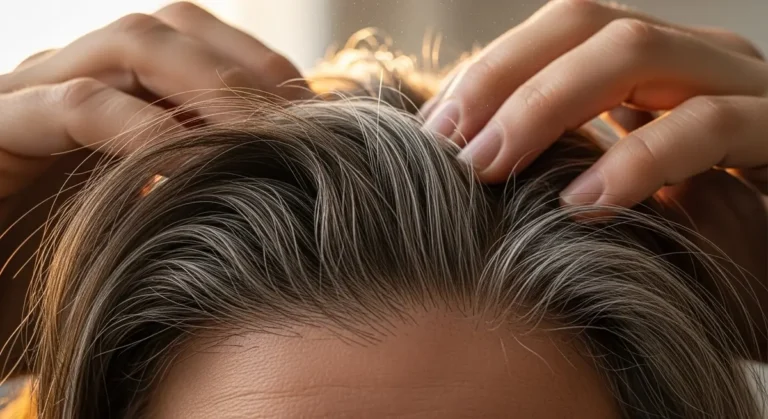Collagen for hair is a growing area where nutrition and beauty science meet. In this article we explain how collagen supports hair strength, elasticity and the hair growth cycle, summarizing clinical research on collagen peptides and the amino acids—glycine, proline and hydroxyproline—that feed hair structure. You’ll get practical, evidence-informed ways to boost collagen through diet, supplements and lifestyle for visible hair benefits.
How Collagen Supports Hair: Biology and Evidence

Collagen is a primary structural protein of the dermis and the extracellular matrix (ECM) that surrounds and supports hair follicles. Far from being an inert scaffold, the collagen-rich ECM creates the physical and biochemical niche that determines how hair follicles anchor, grow and cycle. When the ECM is intact and resilient, follicles are held in place, hair shafts resist bending and breakage, and the local environment favors a robust anagen (growth) phase.
Collagen and the hair-follicle microenvironment
The hair follicle sits within the dermis, surrounded by a meshwork of collagen fibers, elastin and ground substance. Collagen types I and III are the most abundant in the scalp dermis and provide tensile strength and structural continuity between the follicle and surrounding tissue. Mechanically, collagen fibers act like the beams of a building—they maintain shape and prevent deformation when hair is pulled or bent. Biochemically, collagen-rich ECM binds growth factors and provides cues that influence the behavior of follicular stem cells and dermal papilla cells, which together regulate hair growth.
Metaphor: imagine the follicle as a house and the ECM as both the foundation and garden around it: a firm foundation (collagen) keeps the house upright and the garden (ECM signals) feeds the inhabitants.
Amino-acid supply for keratin synthesis
Keratin, the primary protein in the hair shaft, requires a steady supply of amino acids for synthesis. Collagen is uniquely rich in glycine, proline and hydroxyproline—amino acids that form the characteristic collagen triple helix and that can be liberated by collagen turnover or digestion of collagen peptides. When oral collagen peptides are absorbed, they increase the circulating pool of these amino acids and small oligopeptides, which can be used by hair matrix cells to build keratin and other structural proteins.
Vitamin C and other cofactors are critical here: vitamin C is required for the hydroxylation of proline and lysine during collagen synthesis, so adequate vitamin C intake supports both new collagen production in the scalp and efficient use of ingested amino acids.
How collagen can influence the hair growth cycle
Hair growth is regulated by cycles (anagen, catagen, telogen). The ECM modulates signals that tell follicular cells when to remain in anagen and when to enter catagen. A well-organized, compliant ECM fosters a microenvironment that supports prolonged anagen and efficient regeneration after shedding. With aging or chronic damage, collagen fragmentation and reduced ECM integrity alter mechanical stiffness and signaling, which can shorten anagen duration and increase telogen incidence, contributing to thinning.
Simple diagram (visual metaphor):
Scalp surface
|
| <– hair shaft
O <– hair follicle bulb
/|\ <– dermal papilla and matrix cells
==== <– collagen-rich dermis (scaffold)
This simplified sketch helps picture how the follicle (O) is embedded in a collagen matrix (====) that both supports and nourishes the growth apparatus.
Age-related collagen loss: elasticity, thinning and breakage
With chronological aging and photodamage, total collagen content and cross-linking patterns change. The scalp can become less elastic, dermal thickness declines, and the physical anchoring of follicles weakens. Consequences include:
- Reduced hair tensile strength and increased susceptibility to breakage.
- Thinner hair shafts as matrix cells receive fewer structural substrates and signals.
- Increased hair shedding when follicle anchorage is compromised.
The net effect is often a visual reduction in hair density and a change in hair texture—finer, more brittle strands that reflect diminished collagen support.
Evidence from clinical research
Clinical studies of oral collagen peptides report modest but measurable improvements in hair parameters. Typical intervention characteristics across randomized controlled trials include daily collagen peptide doses in the range of approximately 2.5–10 g and treatment periods commonly between 8 and 12 weeks. Outcomes reported in several trials include increases in hair thickness and hair density and reductions in reported hair shedding compared with placebo.
Important caveats: sample sizes are often small to moderate, study populations vary (women only vs mixed cohorts), and some trials have industry sponsorship, which can introduce bias. Mechanistically plausible pathways—improved amino-acid availability, enhanced dermal collagen deposition, and ECM-mediated effects on follicular cycling—align with observed clinical signals, but long-term benefits and effects across diverse causes of hair loss are not yet fully characterized.
Practical implications and realistic expectations
Boosting collagen availability can be one element of a broader strategy to support hair strength. Collagen peptides may supply glycine and proline that help keratin synthesis and may support dermal collagen remodeling, but they are not a standalone cure for androgenetic hair loss or medically driven alopecia. Benefits tend to be incremental and are most reliable when combined with a balanced protein-rich diet and cofactors such as vitamin C, zinc and copper that support collagen production and hair metabolism.
Maintaining scalp health—through sun protection, avoiding smoking, managing inflammation, and ensuring adequate sleep and nutrition—preserves collagen integrity over time and supports stronger, more resilient hair.
Takeaway: collagen acts both as a structural scaffold and as an amino-acid reservoir that together help maintain follicle architecture, keratin production and a favorable growth-phase environment; clinical trials of collagen peptides show promising, but modest, improvements in thickness and density and should be integrated into a holistic hair-wellness plan.
Clinical Research on Collagen Peptides for Hair

Oral collagen peptides have become a focus of clinical research as consumers and clinicians look for nutrition-based approaches to support hair strength and density. Several randomized, placebo-controlled trials and a handful of systematic reviews have examined whether daily hydrolyzed collagen or collagen peptide supplements translate into measurable hair benefits. While study designs vary, common themes and practical takeaways emerge.
Most trials use modest, physiologically plausible doses of collagen peptides, typically between 2.5 and 10 g per day, given as a single serving or split into two. Treatment durations are usually short-to-moderate: many trials report primary outcomes after 8–12 weeks, with some following participants for 3–6 months to capture slower hair-cycle effects. Populations studied are mainly adults with self-perceived thinning or aging-related hair changes; a smaller number include participants with clinically diagnosed alopecia subtypes.
Across the randomized controlled trials, reported benefits cluster around three measurable outcomes:
- Increased hair thickness (shaft diameter) measured by phototrichogram or microscopy.
- Greater hair density (hairs per square centimeter) observed with trichoscopy or standardized scalp imaging.
- Reduced hair shedding reported through hair counts, pull tests or participant symptom scores.
Where improvements reach statistical significance, effect sizes are generally small-to-moderate and often described as modest clinical gains — for example, thicker individual hairs and incremental increases in density rather than a dramatic hair regrowth comparable to pharmaceutical hair-loss therapies. Some trials report perceptual benefits (participants noticing fuller hair) in parallel with objective measures, supporting a real but limited change in hair appearance over the short term.
Safety signals across trials are reassuring. Collagen peptide supplements are usually well tolerated; adverse events are mostly mild and gastrointestinal (bloating, transient dyspepsia) or minor allergic reactions in rare cases. No consistent signals for systemic toxicity or serious adverse events have emerged in the doses commonly studied (2.5–10 g/day). Nevertheless, trial follow-up is often limited, so long-term safety data beyond six months remain sparse.
Critical limitations temper enthusiasm for broad clinical application. Many trials are small (dozens to low hundreds of participants), with short durations that may not capture the full effect across the hair growth cycle. Product heterogeneity is a major confounder: collagen peptides differ in source (bovine, porcine, marine), peptide profiles, manufacturing processes and co-ingredients (some formulas combine collagen with biotin, vitamins or botanical extracts). This heterogeneity makes it difficult to generalize findings to all collagen supplements.
Risk of bias is another concern. Several trials are industry-funded and some lack full transparency about randomization or blinding methods. Outcome measures vary — from objective imaging to subjective participant reports — and systematic reviews have highlighted this inconsistency. Meta-analyses to date suggest a positive direction of effect but emphasize low-to-moderate overall quality of evidence and call for larger, more rigorously designed studies.
From a mechanistic angle, the clinical data align with biological plausibility: ingested collagen peptides deliver amino acids (notably glycine, proline and hydroxyproline) that can support dermal extracellular matrix turnover and provide substrates for keratin production, and some peptide fractions may stimulate dermal fibroblasts. However, supplementation is not a targeted pharmacologic intervention for androgenetic or autoimmune hair loss and should not replace guideline-directed medical treatments when those are indicated.
Putting the evidence into practical perspective:
- Expectation setting: modest improvements in thickness and density over 8–12 weeks are realistic for many users, with clearer changes often evident by 12 weeks and potentially increasing with continued use up to 6 months.
- Dose and duration: commonly studied regimens are 2.5–10 g/day; lower doses (around 2.5 g/day) appear to have benefits in some trials, while higher doses may be used in others without clear superiority. Consistency over months is important because hair changes occur slowly.
- Safety: generally well tolerated at studied doses, but monitor for gastrointestinal symptoms and consider allergy risks (especially with marine sources).
- Complementary measures: collagen strategies work best alongside sufficient dietary protein and cofactors such as vitamin C, zinc and copper that support collagen synthesis and keratin formation.
Conclusions from the clinical literature are cautiously optimistic: randomized controlled trials and reviews indicate that oral collagen peptides can produce measurable, but modest, improvements in hair thickness, density and shedding, with favorable short-term safety. The evidence base is still evolving — constrained by small sample sizes, product heterogeneity, variable outcome measures, and potential conflicts of interest — so collagen peptides should be viewed as a supportive nutritional strategy within a broader hair-wellness plan rather than a standalone cure for significant hair disorders.
For adults seeking to use collagen as part of an anti-aging hair regimen, a pragmatic approach is to choose a reputable collagen peptide product at a studied dose (for example, 2.5–10 g/day), allow at least 8–12 weeks to evaluate early changes, and combine supplementation with a protein-focused diet and cofactors that support collagen synthesis and hair health. Persistent or progressive hair loss warrants clinical evaluation and, when appropriate, evidence-based medical therapies.
Natural Ways to Boost Collagen for Stronger Hair

Collagen is a structural protein that supplies the scalp and hair follicles with the amino acids needed to make keratin and maintain an elastic, well-supported extracellular matrix. When collagen availability is supported through diet, supplements and lifestyle, hair is less prone to thinning, breakage and loss of elasticity. The practical steps below translate biochemical principles — glycine, proline and hydroxyproline as building blocks — into everyday choices that adults can adopt to support hair health.
Why focus on protein quality and specific amino acids
Keratin, the primary protein in hair shafts, depends on a steady supply of amino acids. Collagen is especially rich in glycine and proline; hydroxyproline is a collagen-specific marker that helps stabilize triple-helix structure. Eating and supplying collagen precursors makes those amino acids more available for keratin synthesis and for maintaining the scalp’s extracellular framework that anchors hair follicles.
Dietary strategies that increase collagen availability
-
Prioritize high-quality protein at each meal: aim for 20–30 g of complete protein per meal where possible (eggs, dairy, fish, poultry, lean red meat) to supply general amino-acid building blocks. Plant-forward eaters can combine legumes with whole grains to reach complete protein profiles.
-
Include collagen-rich foods: bone broth, slow-cooked stews using connective tissue, and gelatin-containing dishes provide native collagen and gelatin peptides. While concentrations vary, these foods can complement overall protein intake.
-
Use targeted collagen peptide supplements: clinical trials most commonly use hydrolyzed collagen peptides at 2.5–10 g/day for 8–12 weeks and report improvements in hair thickness, density and reduced shedding in some populations. Peptides are rapidly absorbed as small di- and tripeptides and appear to increase circulating collagen-building signals.
Cofactors and micronutrients that support collagen formation
-
Vitamin C: essential for lysyl and prolyl hydroxylase activity that stabilizes collagen. Including citrus fruits, strawberries, bell peppers or a modest vitamin C supplement (within recommended ranges) alongside collagen intake supports utilization.
-
Zinc and copper: trace minerals act as cofactors for enzymes involved in collagen cross-linking and hair follicle function; dietary sources include shellfish, seeds, nuts, whole grains and organ meats. Maintain these within recommended intake ranges and avoid chronic high-dose zinc without clinical supervision, as excess zinc can cause copper deficiency.
Practical meal and snack ideas
- Breakfast: Greek yogurt smoothie with a scoop (2.5–5 g) of collagen peptides, frozen berries and orange slices for vitamin C.
- Mid-morning snack: hard-boiled egg and a small handful of almonds (for protein and zinc).
- Lunch: salmon or tuna salad over quinoa and mixed greens with bell pepper and lemon dressing (vitamin C + high-quality protein).
- Afternoon snack: cottage cheese with pineapple or kiwi, or a gelatin-based snack plus a few walnuts for copper and healthy fats.
- Dinner: bone-broth-based soup with lentils and vegetables, or roast chicken with sweet potato and steamed broccoli.
Lifestyle measures that protect and promote collagen and hair resilience
- Sleep: aim for consistent 7–9 hours nightly; growth and repair processes including protein synthesis are optimized during sleep.
- Avoid smoking: tobacco accelerates collagen degradation and impairs blood flow to the scalp, undermining hair strength.
- Sun protection: ultraviolet exposure damages dermal collagen; use physical protection (hats) and sun protection on exposed scalp areas to preserve the extracellular matrix.
A realistic 4-week plan to start increasing collagen availability
Week 1 — Foundation
- Focus: protein habit formation. Ensure a source of high-quality protein at each meal (20–30 g). Add one fresh vitamin C-rich fruit daily.
- Monitor: note baseline hair breakage and overall energy; track meals.
Week 2 — Add targeted collagen support
- Focus: introduce 2.5–5 g/day hydrolyzed collagen peptide powder mixed into a morning smoothie or tea. Continue protein targets and vitamin C pairing (fruit or 100–200 mg vitamin C from food or supplement).
- Tip: take collagen with a vitamin C source to support enzymatic stabilization.
Week 3 — Optimize cofactors and diversity
- Focus: increase zinc- and copper-containing foods (pumpkin seeds, oysters, liver in moderation, cashews). If using a multinutrient supplement, confirm zinc and copper doses are balanced.
- Consider increasing collagen peptides to 5–10 g/day if tolerated and desired, keeping total protein goals in mind.
Week 4 — Maintain and evaluate
- Focus: consistent daily routine, scalp-friendly hair care (gentle cleansing, minimal heat), sun protection and sleep hygiene.
- Evaluate: after four weeks you may notice improved hair manageability; for measurable thickness and density, expect to evaluate over 8–12 weeks given how hair growth cycles work.
When to consult a clinician
Discuss these strategies with a healthcare provider if you have rapid or patchy hair loss, signs of systemic deficiency (extreme fatigue, brittle nails), are pregnant or breastfeeding, or are taking medications that affect nutrient status. A clinician can check nutrient levels (iron, ferritin, vitamin D, zinc) and rule out endocrine or autoimmune causes. Because high-dose mineral supplementation can cause imbalances, medical supervision is advised before starting long-term high-dose zinc or copper.
Evidence and realistic expectations
Oral collagen peptides have been studied in randomized trials showing modest improvements in hair thickness, density and reduced shedding after 8–12 weeks at common doses of 2.5–10 g/day, but research is still emerging. The best results come from combining peptides with a balanced protein diet and the cofactors above. Consider collagen strategies as part of a holistic hair-wellness approach that includes restorative sleep, sun protection and smoking cessation.
For additional practical meal ideas and nutrient targets that support hair strength, see nutrient-focused meal ideas that translate protein and micronutrient guidance into everyday choices: balanced, nutrient-focused meal ideas.
Always treat collagen supplementation as one piece of a broader strategy: nutrition, lifestyle, and clinician evaluation when needed provide the strongest base for lasting hair resilience.
Conclusion
Collagen contributes to hair strength by supporting the scalp’s extracellular matrix and supplying key amino acids that help keratin production. Clinical trials of collagen peptides show promising improvements in hair thickness and density, but evidence is still emerging and works best alongside a balanced protein-rich diet and key cofactors like vitamin C, zinc and copper. Use collagen strategies as part of a holistic hair-wellness plan and consult a clinician for persistent hair loss.
Explore natural ways to support hair strength with practical tips and evidence-based strategies: Explore natural hair-strength strategies at RelexaHub.



